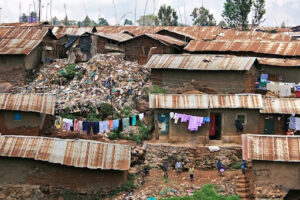
NAIROBI, KENYA – Families sleeping on the streets or in makeshift shelters this is the grim reality facing thousands of Kenyans as the country grapples with an acute homelessness crisis.
In the capital, Nairobi, poverty, forced displacement, and limited access to affordable housing have left many with no option but to live on the streets. The situation affects people of all ages, from children to adults.
“I have been living on the streets for 10 years and there are many challenges,” said Joyce Muthoni, a mother of three who became homeless after losing her job.
“It gets very cold at night, most of the time we are hungry, and the kids are crying. As if that is not enough, the police usually beat us at night,” she added.
According to the 2018 National Census of Street Families, at least 46,639 people are living on the streets across Kenya. The World Bank estimates that 39.8% of Kenyans live below the national poverty line making poverty the main driver of homelessness.
In Nairobi’s Kibera slum, considered the largest informal settlement in Africa, many residents live in poor housing conditions.
Jane Caren Knight, a 22-year-old mother of one, pays Ksh 2,000 (about $17) per month for a small mud house that leaks when it rains.
“The landlord is very harsh. If you don’t pay rent on time, he locks the door or throws out your belongings,” she said.
Some, like Muthoni, are pleading with the government for help.
“We are living like refugees in our own country. If we can be helped to get jobs, we will be able to raise our children and get off the streets,” she appealed.
The government says it is addressing the crisis through its Affordable Housing Programme, which aims to construct over 100,000 homes nationwide.
George Omondi, Director of Housing and Infrastructure at the State Department of Housing and Urban Development, says tackling homelessness requires joint efforts.
“The solution lies in social housing programmes where costs are highly subsidised to help low-income earners buy into these houses,” he explained.
Kenya currently faces a housing deficit of about 2 million homes, according to the World Bank.
Last month, President William Ruto proposed the creation of a multilateral coalition to tackle the global housing shortage.
“The global housing crisis is too vast for any single country to resolve. We must therefore harness the power of multilateralism to confront it,” President Ruto said.

















